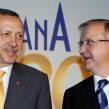
Can Erdogan Break the Stalemate in Turkish-E.U. Relations?
Publication: Eurasia Daily Monitor Volume: 6 Issue: 124
By:

On June 25-26, Prime Minister Recep Tayyip Erdogan visited Brussels where he was presented an award for his contribution to peace. Reflecting on his efforts to revitalize Turkey’s European Union membership project, Erdogan delivered a speech on the issue and met E.U officials. He was accompanied by Foreign Minister Ahmet Davutoglu and the chief negotiator for E.U. talks Egemen Bagis. The statements from both sides reflected the fundamental differences between Ankara and Brussels, in terms of their approaches to the causes of the stalemate in Turkish-E.U. relations and how to proceed.
The Turkish government was severely criticized for backtracking on E.U-related domestic reforms after Brussels decided to launch the negotiations with Turkey in 2005. Last year, concerns grew that unless Ankara took drastic steps, Turkish-E.U. relations might reach deadlock. Amidst speculation that 2009 will be the "make or break" year, Erdogan sent strong signals that he was determined to accelerate the membership process. To this end, he appointed Bagis as the new chief negotiator (EDM, January 12), and visited Brussels (EDM, January 20).
Despite various declarations of intent and high level contacts between Turkish and E.U. officials, so far, no major progress has been accomplished. On the contrary, the prospects of Turkey joining the E.U. appear to be diminishing, while the discussion is gaining ground on giving the country a special status that falls short of full membership.
This stalemate has several related causes. On the European front, the leaders of France and Germany adopted a clear stand against Turkey’s full membership, and instead argued that it should be offered a more realistic alternative, such as a "privileged partnership" (EDM, May 13). Furthermore, during the recent European elections, representatives were elected to the European Parliament from the conservative and center-right parties. Many observers believe that, given these parties’ opposition to Turkey, the political environment in Europe has further turned against Turkey (EDM, June 10).
In Ankara, however, the government has been preoccupied with domestic politics, as well as by pursuing controversial foreign policy initiatives. In the first quarter of the year the municipal elections and the discussions on how to tackle the global financial crisis diverted attention from the European agenda. Although the government has strived to refocus on constitutional change and accelerate the E.U. membership process, it failed largely as a result of its inability to build consensus with the opposition parties (EDM, April 1). The latest discussions on an alleged military document concerning plans to illegally change the government had significant repercussions for the E.U. membership process. It demonstrated the shortcomings of Turkish democracy, and generated an added impetus for the AKP to revitalize the E.U. reform agenda to normalize civil-military relations (EDM, June 23).
Nonetheless, Erdogan’s statements during his recent trip show that his views on Europe remain unchanged. In that sense, the overall dynamics of this visit followed the pattern set in January. He preferred to criticize the Europeans for their mishandling of the accession process, while the latter reiterated their argument that Turkey had to reform its political system in order to comply with European norms.
Erdogan openly criticized some member states’ efforts to stall the accession talks and questioned the sincerity of the Greek Cypriots over finding a lasting solution on the island. Commenting on the European elections, he raised his concerns about the growing populism within Europe. He expressed uneasiness with European politicians’ questioning Turkey’s future membership for short-term political gains. "We want Europeans to resist such inconsistent policies [i.e., openly questioning Turkey’s full membership]. These fluctuating [views] curb Turkey’s enthusiasm to join the E.U. We expect Europe to fulfill its promises to us. The rules cannot be changed in the middle of the game." Erdogan also maintained that "Europe cannot keep pace with Turkey’s reform performance. We expect the E.U. to accelerate the process [i.e., more chapters should opened be for negotiation]" (Cihan, June 26).
After his meeting with the E.U. Commissioner for Enlargement Oli Rehn, Davutoglu emphasized that the growing number of high-level visits reflected Ankara’s eagerness for membership, and that Turkey will accelerate the process. "We are aware of our responsibilities and requirements in terms of the reforms," Davutoglu added. Rehn, however, ruled out any delay in membership talks being caused by the E.U.’s own shortcomings, and stressed that Turkey has to take "concrete" steps and maintain its commitment to reform (Hurriyet, June 26).
The fate of the Turkish-E.U. process appears to hinge on whether the two sides can allay each other’s concerns. For Brussels two issues remain of vital importance: whether the Turkish government will implement constitution reforms and if Ankara will change its attitude toward the Greek Cypriots. Ankara’s major concerns are its perceptions that it is being treated unfairly due to some E.U. member states’ overtly anti-Turkish position, and that its achievements are unacknowledged as a result. Moreover, the slow pace of the accession talks and the growing salience of the "privileged partnership" discussions undermine Turkey’s trust in the E.U.
However justified he might be in his criticism of the Europeans, eventually it will be up to Erdogan to break this stalemate. If he is serious about revitalizing the E.U. membership process, he needs to acknowledge that its current impasse is his own making, whether knowingly or not. He must abandon his complacency and act decisively on the Cyprus issue, similar to his revisionist foreign policy vision prior to 2005. Erdogan has to "talk to" the opposition parties and build domestic consensus to facilitate political reform. Then, he might satisfy both the E.U.’s expectations and strengthen the hands of pro-Turkey groups within the E.U, thus mitigating the intra-E.U. opposition to Turkey.




